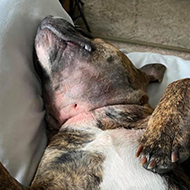
“We'd encourage pet owners to use safer alternatives to sticks.”
National veterinary charity PDSA is warning dog owners of the dangers of stick-throwing games for dogs, after a Staffordshire bull terrier needed emergency surgery when a stick pierced his mouth during a game of fetch.
Danielle Knight, who owns one year old Dre, heard him yelp in pain and noticed blood coming from his mouth, which stopped fairly quickly.
However, the next day, Dre's tongue and neck had swollen significantly, so Danielle called the PDSA for help, who admitted Dre to the hospital straight away.
Suzy Shuttleworth, PDSA veterinary surgeon, said: “Once Dre had been given pain killers and put under anaesthetic, we discovered a large area of swelling under Dre’s jaw and a hole under his tongue. We were shocked to discover a 1-inch piece of stick lodged under his tongue!”
PSDA carried out surgery to remove the stick, and Dre was able to return home to recover in time for Christmas with antibiotics, pain relief and close monitoring.
Suzy warned pet owners: “We love to see people exercising their pets, but we’d encourage pet owners to use safer alternatives to sticks which you can buy from most supermarkets or pet shops.”
Dre's owner Danielle added: “I’d encourage all pet owners to keep sticks well away from pets to avoid injuries. Had it not been for PDSA, we could have lost Dre.
“We had only adopted him this year and would have struggled to afford the cost of surgery, but thankfully, we were eligible for PDSA’s services. We cannot thank the team at Nottingham PDSA enough.”
Image (C) PDSA



 The Veterinary Medicines Directorate (VMD) is inviting applications from veterinary students to attend a one-week extramural studies (EMS) placement in July 2026.
The Veterinary Medicines Directorate (VMD) is inviting applications from veterinary students to attend a one-week extramural studies (EMS) placement in July 2026.